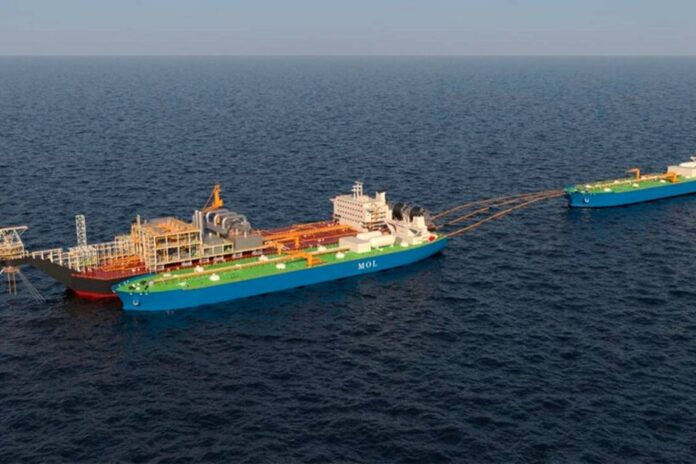The FSIU would be able to receive LCO₂ transported in low pressure condition, store, and inject it into subsea wells at high pressure for permanent sequestration, which eliminates a need for onshore LCO₂ receiving plant and pipeline to injection wells.
The unit is engineered for a maximum CO₂ injection capacity of 10 million tonnes per annum (MTPA), with a minimum total tank storage capacity of 100,000 m³.
To support uninterrupted injection operation, the FSIU will feature both tandem loading at the aft and simultaneous side-by-side loading at the midship port side, enabling flexible and efficient LCO₂ transfer from LCO₂ carriers, up to 90,000 m3 capacity (tandem) and up to 50,000 m3 (side-by-side).
The FSIU hull was developed in collaboration with Mitsubishi Shipbuilding Co. Ltd. (MSB), while the mooring system incorporates a SOFEC External Turret to allow dual loading operation as well as station keeping in non-directional environment as often found in Southeast Asia. The FSIU will also be equipped with diesel engine generators integrated with a carbon capture system on the topside, minimizing operational CO₂ emissions.
This concept was developed in collaboration with Mitsui OSK Lines Ltd. (“MOL”), to leverage their experience and market position with LCO₂ carriers and its proven methods of safe storage, transport and offloading.
By serving as an offshore storage and injection hub, the FSIU enables the sequestration of CO₂ into qualified reservoirs. By offering large-scale, flexible, and reliable offshore CO₂ storage, this solution supports the global transition to low-carbon energy.

This collaborative approach is positioned as a further example of a “Concept Design of Floating Alternative Energy Production Facility” as stated in the Mid-term Business Plan 2024-2026“Explore a Sustainable Future with Innovation”. The concept of carbon storage and injection is achieved by leveraging MODEC’s expertise in overall layout, hull design and mooring technology, cultivated in Oil & Gas FPSO projects, with MOL’s expertise in LCO₂ transport. This FSIU is designed for a wide range of offshore field locations and potential clients.
For the purpose of this AiP, BV’s technical experts conducted a comprehensive design review of the LCO₂ FSIU. The review encompassed critical safety aspects associated with the hull structure, mooring system, and LCO₂ storage, handling, and injection systems. By rigorously assessing the design against applicable BV Rules and international regulations, BV’s technical experts validated the FSIU’s technological and operational feasibility.
MODEC considers this AiP as further demonstration of a floating solution for alternative energy production and will continue to strive to refine and mature this concept to address the key challenges for commercialization identified during this development. We will contribute to the effective reduction of emissions through innovative, technically sound and cost-effective solutions, continuing in striving to achieve the decarbonization of the global energy supply chain through developing new technologies for a sustainable future.
Arata Kamishohara, VP Business and Project Development at MODEC noted:
“While this FSIU is a new concept, each component on the unit is not necessarily new to MODEC. MODEC has experience of CO₂ injection (removed from pre-combustion produced gas) and dual (oil) offloading system. All the utility systems are similar to what we do on FPSOs every day.
We collaborated with MOL, who cover the transportation portion of CCUS value chain, for interfaces between LCO₂ carriers and the FSIU.
With this, we are planning to achieve $5/tCO₂ or less, which I don’t think is a stretch target.”
Matthieu de Tugny, Executive Vice President, Industrials and Commodities at Bureau Veritas, said:
“We are delighted to award this Approval in Principle to MODEC for its innovative Floating Storage and Injection Unit concept. This project demonstrates how established offshore expertise can be applied to enable safe, reliable and scalable carbon storage solutions. Bureau Veritas is committed to supporting the development of technologies that accelerate the transition to a low-carbon future, and this AiP reflects our role in helping industry stakeholders bring practical maritime solutions to market with confidence.”



